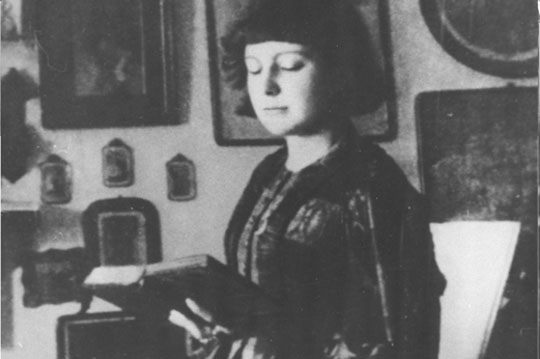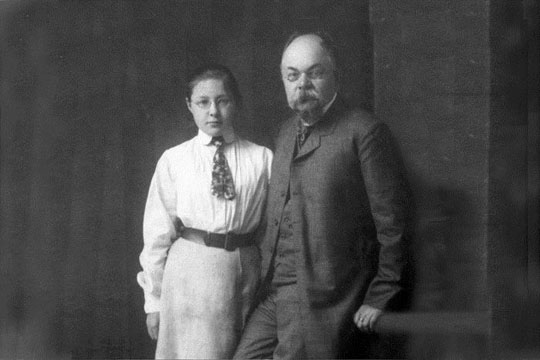Honor the Verses, Lift Up Your Voice
Freiburg, May 23, 2017
Readings, exhibitions, concerts, language courses and lots of cultural exchange – the "Tsvetaeva (Zwetajewa) Center for Russian Culture at the University of Freiburg" opens on 23 May 2017. The institution's aim is to strengthen the special relationship between the Russian culture and the region around Freiburg. It has also been set up as a memorial to the writer Marina Tsvetaeva.
 "Within me are many souls, But my main soul is German." Marina Tsvetaeva admired the land of poets and thinkers. As a young person, she spent happy times in Freiburg and the Black Forest.
"Within me are many souls, But my main soul is German." Marina Tsvetaeva admired the land of poets and thinkers. As a young person, she spent happy times in Freiburg and the Black Forest.
Photo: Marina Tsvetaeva Museum, Moscow
"My verses will be like precious, grapes of a fine vintage, their place will only be recognized in the future." Her lines sound hopeful, pleading and a little bit defiant. When Marina Tsvetaeva wrote those words in May 1913, neither the 21-year-old poet nor the 20th century had suffered the devastating caesuras the future would bring. A year later, the tsarist empire began to crumble. Millions died in the storm of bullets of the First World War. In 1917, the Bolsheviks violently proclaimed the "dictatorship of the proletariat" and Tsvetaeva, the daughter of a wealthy, bourgeois family became an enemy of the Soviet Union even as it was taking shape.
She fled first to Berlin, then Prague, and finally to Paris. In 1939, she returned from exile with her family. Her husband, Sergei Efron, was accused of spying and shot. Her daughter, Ariadna, was thrown into prison and Marina's sister Anastasia, ended up in a Siberian labor camp. When the German air force, the Luftwaffe, dropped its first bombs on Russia in 1941, Tsvetaeva chose to take her own life. She left behind a young son. And an opulent collection of poems, letters, diaries and prose.
 Marina Tsvetaeva came from an affluent family that valued culture highly. Her father, Ivan Tsvetaev, was a social scientist who was renowned in Europe. He was also the founder of what is today the Pushkin Museum in Moscow.
Marina Tsvetaeva came from an affluent family that valued culture highly. Her father, Ivan Tsvetaev, was a social scientist who was renowned in Europe. He was also the founder of what is today the Pushkin Museum in Moscow.
Photo: Marina Tsvetaeva Museum, Moscow
Celebrating literature, music and art
For Elisabeth Cheauré, Professor of Slavic Philology and Gender Studies at the University of Freiburg, this oeuvre embodies "the spirit of a European-minded author who wanted to create bridges between cultures. While doing this she became on the one hand, highly political, yet on the other, remained deeply personal."
The new center founded in her name is to showcase Russian literature, music and art, support Russian artists locally, and to provide a platform for cultural exchange. Cheauré will lead the center. The researcher emphasizes that the institution bears Tsvetaeva's name, " ...particularly because she represents the close ties between Freiburg and Russia."
Tsvetaeva spoke German during her childhood. She admired Goethe and Heine and with her sister, attended school in Freiburg for a year. She also spent some time in the Black Forest. Cheauré refers to Tsvetaeva's famous poem An Deutschland in which the author gave herself to a lost cause. In 1914, when her compatriots are consumed with hatred for "Germania," she shows solidarity with the land of poets and thinkers, writing, "In love with you for as long as I live, I swear eternal loyalty."
Getting Russian-speakers conversing with each other
"You really have to admire the amazing courage that Tsvetaeva mustered," says Cheauré. "In a time filled with hate, she lifted up her voice and argued in favor of culture as a force that binds all peoples together." The center will continue this legacy. Cheauré goes on, "Particularly in politically tense times, valuing culture can guard against blunt nationalism." Baden is a bastion of Russian speakers of different ethnicities and nationalities, she elaborates, whether they're ethnic Germans who've only now returned from Kazakhstan, Lithuanian Jews, Ukrainians, White Russians or Uzbeks. "We would like to bring all of them in contact with each other," says Cheauré.
City-university partnership
The Tsvetaeva Center located on Stadtstraße 5 is the product of a cooperation between the university and the city of Freiburg. What is important to Cheauré is that the center work together with the city's cultural institutions. "We want to support each other and consolidate our resources," says Cheauré. The building where the center is located could incidentally become an additional facility for promoting cultural relations. The International Graduate Research Training Group of the university is also housed there. It has been examining German-Russian cultural contacts from the 17th century to the present and is the only institution of its kind in Germany.
The center's offering is to expand gradually. Currently, readings, concerts, lectures and language courses are on the agenda. As is a gargantuan project set to begin in the autumn: One hundred years after the Russian Revolution, the center will in October and November 2017 offer events almost daily for seven weeks – ranging from exhibitions on the gulag in the University Library to concerts featuring experimental music from the 1920s and 1930s to a street art project.
Late appreciation
The "place of recognition" that the poet demanded for herself came late. Only in the 1960s, when the Soviet Union experienced a "thaw" after the death of Joseph Stalin, was Marina Tsvetaeva rehabilitated and included into the canon of Russian literature. The only surviving member of the family, Ariadna, published the works her mother left behind. In 1992, the Marina Tsvetaeva Museum was opened in Moscow, in the last apartment where the poet had lived.
Rimma Gerenstein
Tsvetaeva (Zwetajewa) Center
The "Tsvetaeva (Zwetajewa) Center for Russian Culture at the University of Freiburg" is an independent, non-profit association that was founded at the end of 2016. The responsible bodies are the University of Freiburg and the Cultural Affairs Office of the city of Freiburg. The German Federal Cultural Foundation is financing the upcoming project in autumn 2017 to mark the 100th anniversary of the Russian revolution. Prof. Dr. Elisabeth Cheauré is the association's chairwoman. Rector Prof. Dr. Hans-Jochen Schiewer is Cheauré's deputy.
Tsvetaeva (Zwetajewa) Center for Russian Culture at the University of Freiburg

